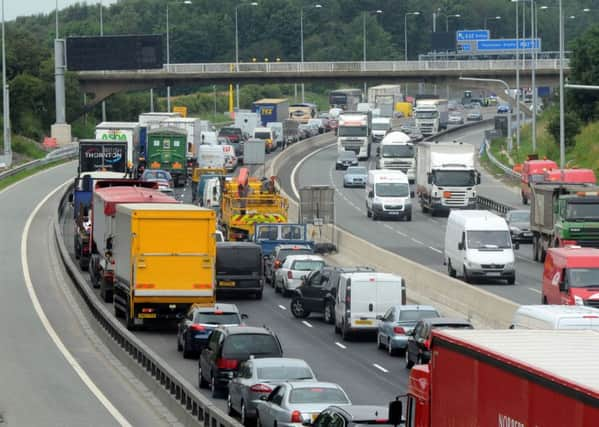Major rail investment needed to cut trans-pennine journey times - report


Transport for the North (TfN) has told the Chancellor significant investment in new rail track and upgrades of existing lines beyond the Government’s current spending plans will be needed so high speed trains can transport passengers between Sheffield, Leeds and Manchester in 30 minutes.
Making it easier and quicker to travel between towns and cities is one of the central planks of Mr Osborne’s drive to strengthen the northern economy and close the north-south divide.
Advertisement
Hide AdAdvertisement
Hide AdTfN has been tasked by the Chancellor to devise plans to dramatically improve the North’s transport network and its latest report includes four possible ‘corridors’ for a new road tunnel connecting South Yorkshire and Manchester.
It suggests there could also be an economic case for upgrading the A66 to provide an alternative trans-pennine route to the M62.
And it sets out plans to roll-out ‘Smart North’, a scheme allowing passengers to use their mobile phone or credit card to use public transport across the North in a similar way to London’s Oyster card.
TfN was originally set up by councils to lead the transformation of transport across northern England before becoming an official body advising the Government.
Advertisement
Hide AdAdvertisement
Hide AdIts report and another by the National Infrastructure Commission on north transport are being published ahead of next week’s Budget and the Chancellor is facing calls to commit the Government to backing specific projects.
Sarah Green, director for nations and regions at the CBI, said: “While it is encouraging to see progress on Transport for the North’s strategy, we now need to move from planning to delivery to maintain momentum.
“It’s in everyone’s interests for politicians to take a long term view and invest in truly transformational infrastructure across the North of England.”
Leeds City Council leader Judith Blake said: “While we welcome this report and the work of Transport for the North so far, it’s imperative that major government investment in transport infrastructure in Yorkshire is delivered as soon as possible.
Advertisement
Hide AdAdvertisement
Hide Ad“Reducing journey times and simplifying the travel experience through innovations like smart ticketing is essential to the future economic development of the region. However the fact remains that far more government money is spent on transport infrastructure in London and the south east compared to Yorkshire. This has to be addressed if the north is to really fulfil its true economic potential.”
Transport Minister Andrew Jones, the Harrogate MP, insisted the Government was already improving transport in Yorkshire through investment in road and rail schemes and the launch of new rail franchises next month.
He said: “Do I think people are impatient for more infrastructure? Yes I do think that, that is because we have underinvested as a country in infrastructure over decades.
“But that is not an accusation which can be levelled at this government because we are putting in record amounts of investment in road and rail.”
Advertisement
Hide AdAdvertisement
Hide AdHe added: “We know we need transport investment, we know that it is a key ingredient of the ‘northern powerhouse’, we know we’ve underinvested in our country for decades and we are breaking out of that.”
Stephen Joseph, chief executive of the Campaign for Better Transport, said: “This Northern Transport Strategy report is a good start, and its recognition that the key to growth in the North is ‘efficient and affordable public transport’ and alternatives to car commuting is especially welcome.
“But this needs to be carried through to future roads investment, which should move from big unaffordable grand projects like the Trans-Pennine tunnel to making better and smarter use of existing roads. Users and communities across the North need good high quality alternatives to car travel, not old-style road plans and the car-based development they bring.”